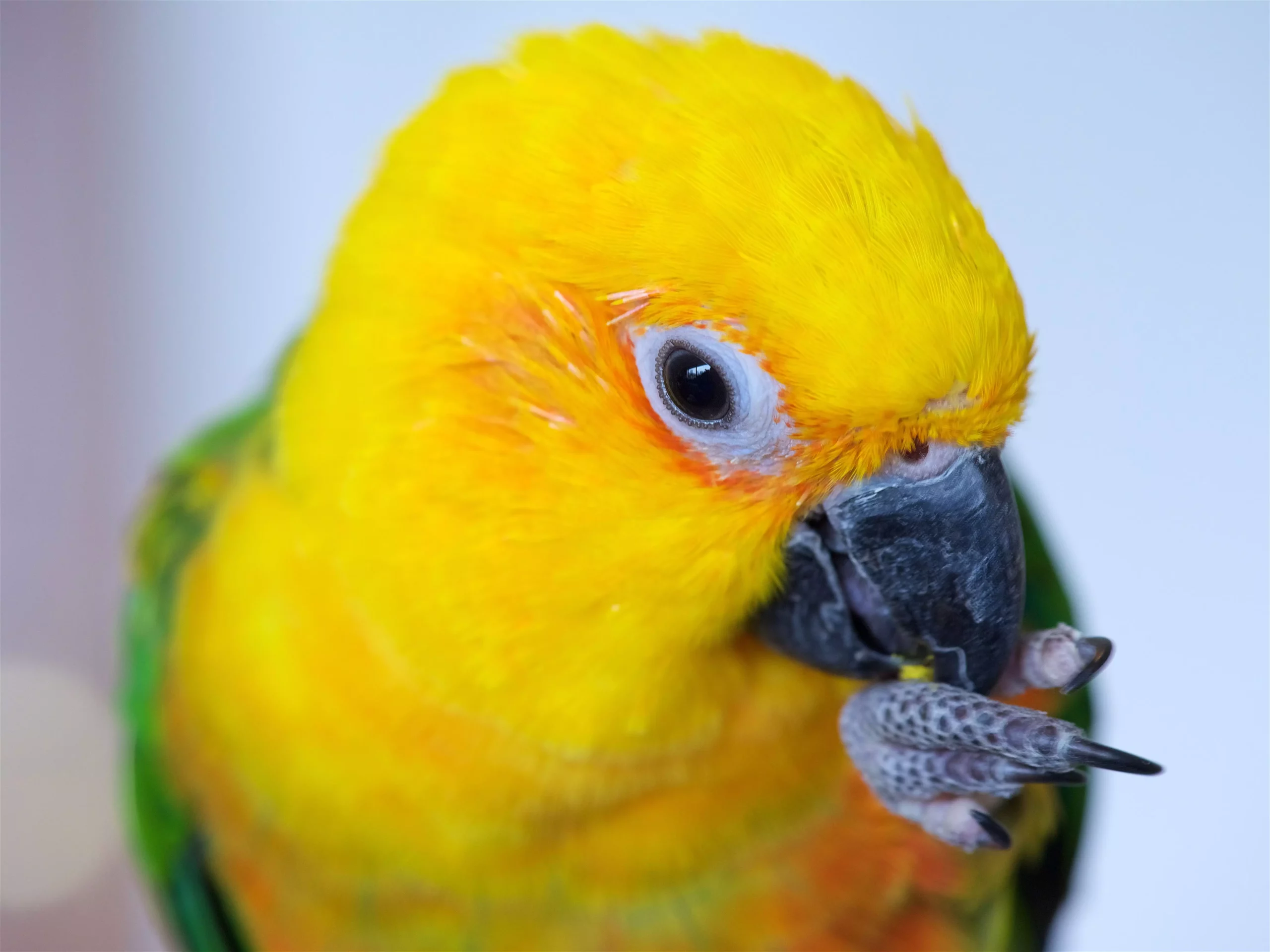Jenday conures, affectionately called jandaya parakeets or flaming parakeets, are captivating little parrots that have become favored companions due to their vibrant personalities and social nature. These birds, formally classified as Aratinga jandaya, measure approximately 12 inches from beak to tail and can live for over 30 years, making them a long-term commitment for potential owners.
Originating from the lush woodlands and palm groves of northeastern Brazil, jenday conures flourish in small flocks in the wild. Their name derives from the Old Tupi language, translating to “small parrot,” which aptly describes their compact yet delightful size. As playful and affectionate creatures, they offer substantial companionship; however, they require dedicated interaction and attention to thrive in a home setting.
The jenday conure’s social disposition makes it an excellent candidate for families, especially those with children. These birds are not only friendly and colorful but also characterized by a joyful vivacity that can bring life to any household. A key consideration for potential owners, however, is the amount of time and energy they can devote to their feathered friends. Jenday conures require several hours of social interaction daily; otherwise, they may resort to destructive behaviors, stemming from boredom or loneliness.
Being intelligent creatures, jendays can learn basic tricks and even mimic commonplace noises, such as the sounds made by household appliances. While they may not replicate full sentences like larger parrot varieties, their ability to imitate environmental sounds can still be entertaining to their owners. Nonetheless, their vocalizations can be a double-edged sword. If neglected, they are known to make loud, persistent calls, which can become a nuisance for neighbors. Therefore, while owning a jenday conure can be rewarding, it may not be the best fit for those living in close quarters like apartments.
Physical Attributes and Care Requirements
Jenday conures are distinguished by their striking multicolored plumage, featuring a red-orange body with green wings and a bright yellow head adorned with orange facial patches. Their tails showcase stunning blue feathers, adding to their overall aesthetic appeal. However, prospective owners should also consider the practical aspects of caring for their new pet.
These birds need ample space to move and exercise, so a spacious cage is essential. A minimum cage size of 3 feet long and 2 feet wide and tall is recommended, with ample room for flight if you want to keep more than one bird. Failure to provide sufficient space can lead to crankiness and stress due to confinement. Jenday conures should be given ample opportunities for supervised out-of-cage time daily; ideally, this would be at least two hours where they can play safely outside of their cages in a controlled environment.
In terms of nutrition, jenday conures benefit from a balanced diet rich in various foods. In the wild, their natural diet consists of fruits, seeds, and nuts, which can be replicated in captivity with a mixture of high-quality pellets, fresh fruits, and vegetables. It’s essential to maintain a clean feeding environment to prevent any health issues, as their susceptibility to illnesses such as Proventricular dilatation disease or Psittacine beak and feather disease can be exacerbated by poor hygiene.
Regular visits to an avian veterinarian are recommended to monitor their health, particularly if warning signs such as lethargy or loss of appetite appear. Being aware of their dietary needs and maintaining proper hygiene can help prevent common ailments and contribute to a longer, healthier life for your jenday conure.
Companionship and Interaction
Due to their affectionate nature, jenday conures often bond closely with their owners. Indeed, many birds may choose to become particularly attached to a single person in the household. However, importantly, most jendays do well in a family environment, happily interacting with everyone. This ability to embrace companionship emphasizes their suitability as family pets, especially for those who can provide the necessary time and love.
Adding to their playful and social demeanor, jenday conures can become cuddly, enjoying physical affection and seeking attention from their human companions. They will often indicate their desire for interaction by presenting their heads for petting or snuggling close to their favorite person.
While jenday conures can make delightful companions filled with love and spirit, potential owners should be ready for the challenges that accompany raising a social bird. Their noisy tendencies, specific dietary needs, and requirement for ample interaction all should be taken into account. However, for those willing to invest time and energy, the joy of living with a cuddly, vibrant jenday conure can be immensely rewarding, offering both companionship and vivid bursts of character that enrich daily life. Before welcoming a jenday conure into your home, be sure to research and prepare adequately so you can provide the supportive, engaging environment they deserve.

